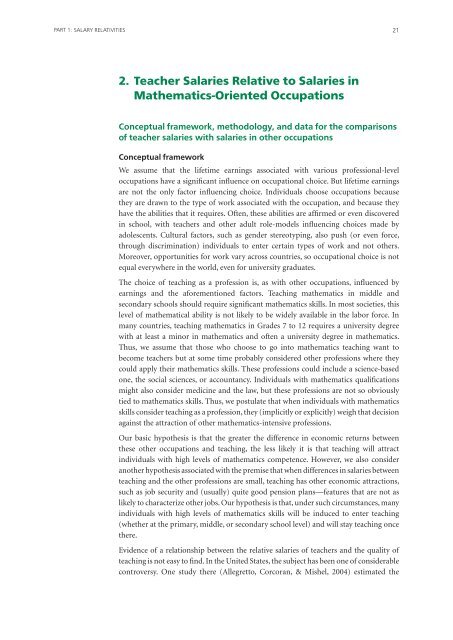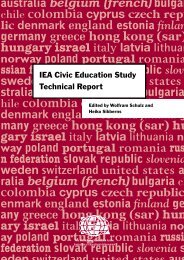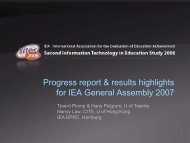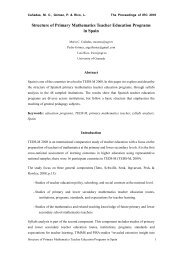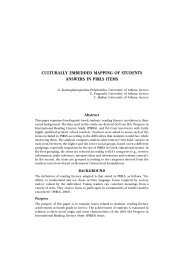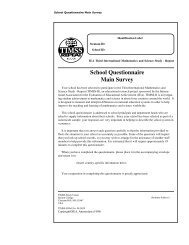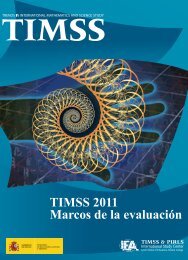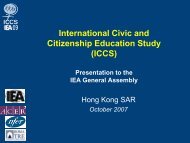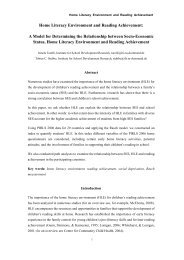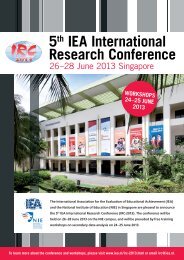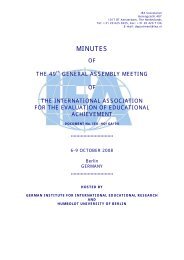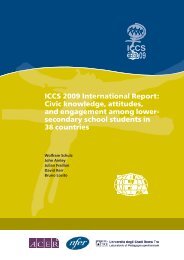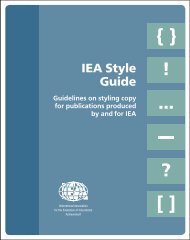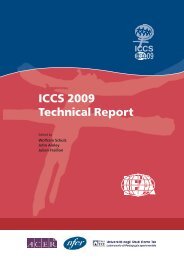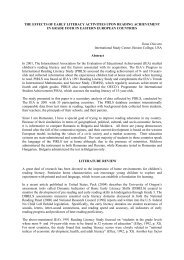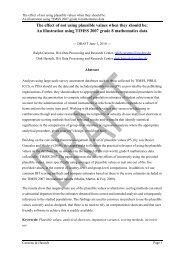Teacher Education and Development Study in Mathematics - IEA
Teacher Education and Development Study in Mathematics - IEA
Teacher Education and Development Study in Mathematics - IEA
Create successful ePaper yourself
Turn your PDF publications into a flip-book with our unique Google optimized e-Paper software.
PART 1: SALARY RELATIVITIES<br />
21<br />
2. <strong>Teacher</strong> Salaries Relative to Salaries <strong>in</strong><br />
<strong>Mathematics</strong>-Oriented Occupations<br />
Conceptual framework, methodology, <strong>and</strong> data for the comparisons<br />
of teacher salaries with salaries <strong>in</strong> other occupations<br />
Conceptual framework<br />
We assume that the lifetime earn<strong>in</strong>gs associated with various professional-level<br />
occupations have a significant <strong>in</strong>fluence on occupational choice. But lifetime earn<strong>in</strong>gs<br />
are not the only factor <strong>in</strong>fluenc<strong>in</strong>g choice. Individuals choose occupations because<br />
they are drawn to the type of work associated with the occupation, <strong>and</strong> because they<br />
have the abilities that it requires. Often, these abilities are affirmed or even discovered<br />
<strong>in</strong> school, with teachers <strong>and</strong> other adult role-models <strong>in</strong>fluenc<strong>in</strong>g choices made by<br />
adolescents. Cultural factors, such as gender stereotyp<strong>in</strong>g, also push (or even force,<br />
through discrim<strong>in</strong>ation) <strong>in</strong>dividuals to enter certa<strong>in</strong> types of work <strong>and</strong> not others.<br />
Moreover, opportunities for work vary across countries, so occupational choice is not<br />
equal everywhere <strong>in</strong> the world, even for university graduates.<br />
The choice of teach<strong>in</strong>g as a profession is, as with other occupations, <strong>in</strong>fluenced by<br />
earn<strong>in</strong>gs <strong>and</strong> the aforementioned factors. Teach<strong>in</strong>g mathematics <strong>in</strong> middle <strong>and</strong><br />
secondary schools should require significant mathematics skills. In most societies, this<br />
level of mathematical ability is not likely to be widely available <strong>in</strong> the labor force. In<br />
many countries, teach<strong>in</strong>g mathematics <strong>in</strong> Grades 7 to 12 requires a university degree<br />
with at least a m<strong>in</strong>or <strong>in</strong> mathematics <strong>and</strong> often a university degree <strong>in</strong> mathematics.<br />
Thus, we assume that those who choose to go <strong>in</strong>to mathematics teach<strong>in</strong>g want to<br />
become teachers but at some time probably considered other professions where they<br />
could apply their mathematics skills. These professions could <strong>in</strong>clude a science-based<br />
one, the social sciences, or accountancy. Individuals with mathematics qualifications<br />
might also consider medic<strong>in</strong>e <strong>and</strong> the law, but these professions are not so obviously<br />
tied to mathematics skills. Thus, we postulate that when <strong>in</strong>dividuals with mathematics<br />
skills consider teach<strong>in</strong>g as a profession, they (implicitly or explicitly) weigh that decision<br />
aga<strong>in</strong>st the attraction of other mathematics-<strong>in</strong>tensive professions.<br />
Our basic hypothesis is that the greater the difference <strong>in</strong> economic returns between<br />
these other occupations <strong>and</strong> teach<strong>in</strong>g, the less likely it is that teach<strong>in</strong>g will attract<br />
<strong>in</strong>dividuals with high levels of mathematics competence. However, we also consider<br />
another hypothesis associated with the premise that when differences <strong>in</strong> salaries between<br />
teach<strong>in</strong>g <strong>and</strong> the other professions are small, teach<strong>in</strong>g has other economic attractions,<br />
such as job security <strong>and</strong> (usually) quite good pension plans—features that are not as<br />
likely to characterize other jobs. Our hypothesis is that, under such circumstances, many<br />
<strong>in</strong>dividuals with high levels of mathematics skills will be <strong>in</strong>duced to enter teach<strong>in</strong>g<br />
(whether at the primary, middle, or secondary school level) <strong>and</strong> will stay teach<strong>in</strong>g once<br />
there.<br />
Evidence of a relationship between the relative salaries of teachers <strong>and</strong> the quality of<br />
teach<strong>in</strong>g is not easy to f<strong>in</strong>d. In the United States, the subject has been one of considerable<br />
controversy. One study there (Allegretto, Corcoran, & Mishel, 2004) estimated the


